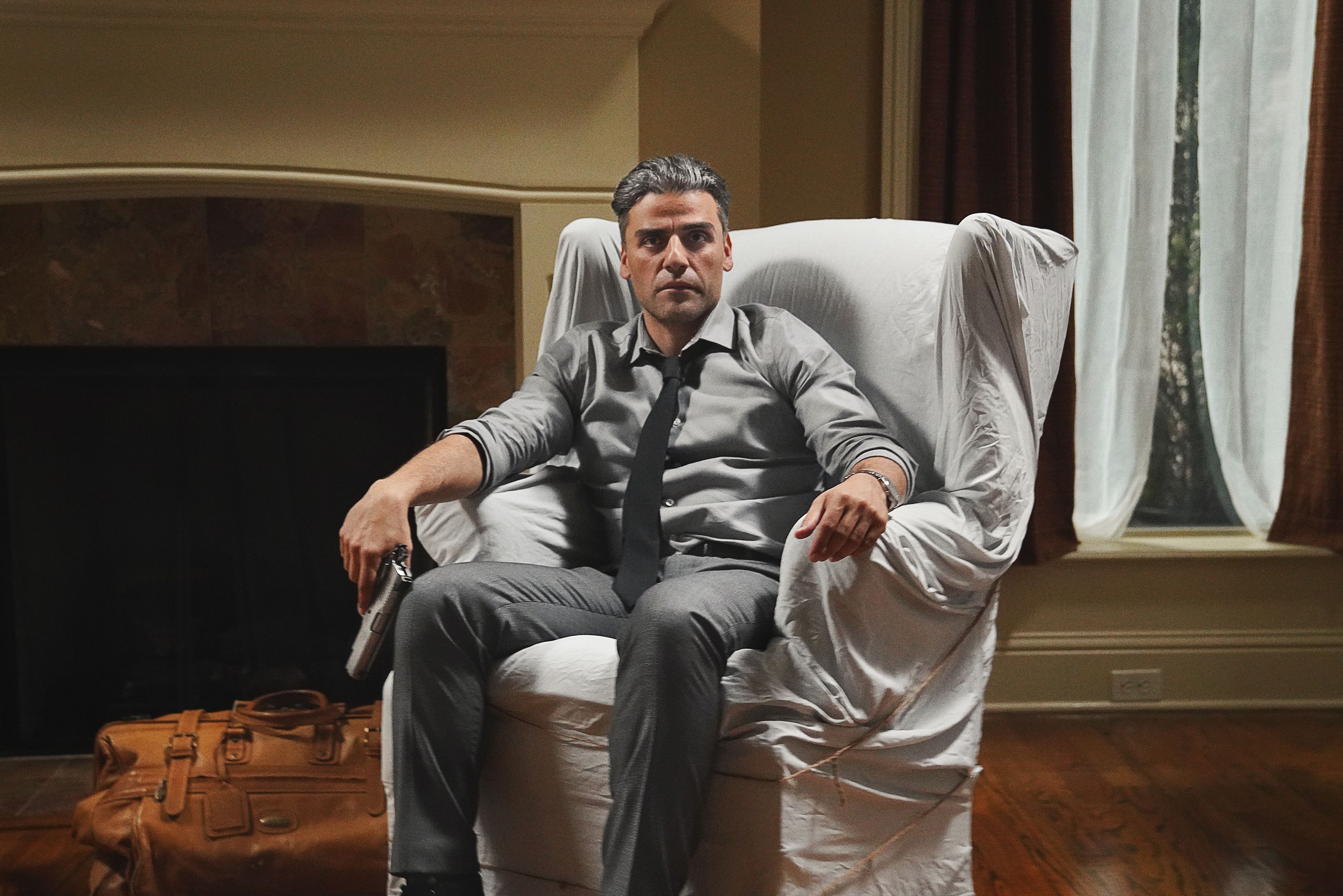The inside of his motel room must be shrouded in pristine white cloth, which he retrieves, impeccably folded, from his suitcase, never overpacked and containing but a handful of neutral, fitted suits. At the nightly poker table he recedes, an enigma with a winning hand, never breaking his stare, or a sweat. He speaks little but peers, with the haunted intensity of a walking ghost, as if through his rivals.
As played in a masterfully controlled performance by Oscar Isaac, the troubled soul at the center of Paul Schrader’s superb new picture The Card Counter is a cool customer card shark on the poker circuit. An operator with a mysterious burden, the origins of his sin, self-reproach and recession only gradually come into focus. In Schrader’s world he is God’s Lonely Man, one foot cemented in the past, racked with an invisible guilt, the other hiding in plain sight, publicly and personally wary.
Across his estimable career—he is, after all, one of the few remaining mavericks of 70s Hollywood counterculture that built a legion of great filmmakers—Schrader has devoted considerable energies to the notion of men in spiritual decline in pictures that include Taxi Driver (which he authored), American Gigolo, Hardcore, Light Sleeper, Affliction, First Reformed—all anxiety-fueled examinations of men on the margins, tormented by self-doubt, and often loneliness.
Night after night, they lay in existential angst, sharing their deepest thoughts only in journals (and movie voice overs), pursuing offbeat vocations or causes that will test, and often break them. In The Card Counter, Schrader has once again crafted another morality play that owes as much to Light Sleeper as to First Reformed, similar bargaining parables about assuaging pain, sometimes hour by hour, until the past must be confronted.
William Tell (Isaac), the nom de guerre adopted by one William Tillich, a former special ops interrogator in Abu Ghraib whose torture tactics led to a prison sentence, fits especially well into Schrader’s oeuvre. Like Ethan Hawke’s Reverend Toller in Schrader’s recent First Reformed, Tell is wrestling with both personal demons and those of mankind. In the former, it was our casual destruction of the planet and its impending demise; here it is America’s role in the barbaric treatment of political prisoners.
Contemporary social gravitas aside, The Card Counter is a throwback of sorts, a slow-burn morality tale that begins with the line, “I never imagined myself as someone suited to incarceration,” a contemplation that informs the entire picture—one about prisons, mostly those self-created. Parole, when it comes for Tell in the form of a shot at personal redemption, is almost irrelevant—he years to return to solitude, or perhaps has never left.
Picture opens after an eight-year stint in lockup, which has done little to quell Tell’s demons, driven by a past in “enhanced interrogation” circa 2003 Iraq as an American soldier photographed in notoriously compromising positions with terrorized inmates. Under the orders of Major John Gordo (Willem Dafoe)—his superior who evaded prosecution—Tell has simmered for the better part of a decade under incarceration, during which he has become a superlative poker player, and card counter, while receding to an interior world. So deeply buried is he that Schrader’s signature voiceover narration seems mandatory to bring us close.
Post parole, Tell hustles two-bit casinos along the Easter seaboard, pocketing quick cash at the poker tables of Atlantic City while bedding down in transient motels. Perhaps in tribute or out of comfort, he replicates the drab austerity of his former cell by covering the rooms in plain white fabric. When sleep arrives, visions of his past are inescapable.
Two new developments intervene—Tell is scoped out by a former circuit acquaintance, La Linda (Tiffany Haddish), who guarantees a big payday should he agree to partner up with her backers. And a chance encounter with Gordo, giving a speech at a security conference in a hotel ballroom, connects him with young Cirk (pronounced Kirk). Cirk (Tye Sheridan, effectively underplaying) immediately recognizes Tell, offering that his father was also a former interrogator under Gordo who after serving his sentence rode his guilt to suicide.
This triangle offers Tell redemption through the low-key, growing mutual affection with La Linda and the chance to put Cirk on the right path—pay off his debts, heal his damaged relationship with his mother and get him back in school.
But Cirk wants something else first—revenge. Gordo, a private citizen contractor who architected the torture tactics, remains free and prosperous, having avoided the court-martialing of his men. This, to Cirk (and Tell), is unacceptable.
After initially rebuffing La Linda, Tell recognizes the opportunity to make large sums that will help Cirk, cautiously agreeing to partner. For a moment, we wonder if the picture will take a turn toward Stephen Frears’ The Grifters, with a trio of ace con artists on the take. But not so—Schrader is after something more troubling.
Throughout, there is appealing chemistry between Haddish, playing against type with subdued, low-key warmth, and Isaac, whose Tell surprises himself, and us, by opening up. A vividly imagined date on an evening walk through the Missouri Botanical Garden, lit by thousands of Christmas lights eventually leads to an earned moment of intimacy, Isaac abandoning his controlled physicality in favor of carnal directness.
Cirk eventually gets bored with the gambling circuit and abruptly departs, pushing the narrative into its explosive final stretches, including a motel room confrontation electrifying in intensity, Schrader setting the stage for a climax of violent retribution.
The Card Counter’s ending departs from expectation by eschewing narrative convention. Yet in a remarkable final scene, Schrader unites notions of self-sacrifice and unlikely absolution as only he can; the final shot is compassionate, audacious and masterful in its simplicity.
Cinematographer Alexander Dynan glides his camera over poker and blackjack tables, across last-call hotel lounges and beside low-rent motel pools, providing an inviting retro-vibe to its contemporary, road movie hustle. And special mention to musician and composer Robert Levon Been, whose previously lent his gifts to the final sequence of Light Sleeper (also starring Dafoe) and here contributes a haunting collection of weary ballads.
Isaac, a terrific actor whose repertoire extends from indie grit to commercial behemoths, has always been an actor in search of a breakout lead commercial role. And while contemplative The Card Counter is unlikely to be that catapult, it may just be his best work to date, at the top of the year’s indelible movie portraits.
The Card Counter is one of the year’s best.
4 stars.



